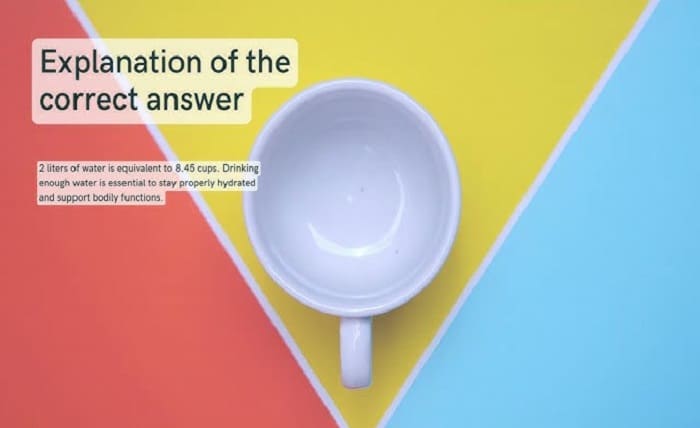Liters to Gallons: A Comprehensive Guide

Introduction
Converting liters to gallons is a common task in many fields, including science, engineering, cooking, and daily life. Understanding how to convert liters to gallons can make various tasks easier, from following a recipe to calculating fuel efficiency. This comprehensive guide will explain the conversion process, provide practical examples, and highlight the importance of knowing how to convert liters to gallons accurately.
By mastering the conversion of liters to gallons, you can navigate between different measurement systems seamlessly, making it easier to handle tasks that require both metric and imperial units. This guide will walk you through everything you need to know about converting liters to gallons.
The Basic Units: Liters and Gallons
Before diving into the conversion process, it’s essential to understand what liters and gallons are. A liter is a metric unit of volume commonly used worldwide for measuring liquids. On the other hand, a gallon is an imperial unit of volume used primarily in the United States and a few other countries.
Understanding the difference between liters and gallons is crucial for accurate conversion. While the metric system is more straightforward with its base-10 structure, the imperial system, which includes gallons, can be a bit more complex. Recognizing these units’ contexts and applications can help clarify why and how to convert liters to gallons.
The Importance of Converting Liters to Gallons
The ability to convert liters to gallons is vital in various scenarios. For instance, if you’re traveling between countries that use different measurement systems, knowing how to convert liters to gallons can help you understand fuel prices and consumption. Similarly, recipes from different parts of the world might use liters or gallons, requiring you to convert between the two for accurate measurements.
Converting liters to gallons also plays a significant role in scientific research, where precise measurements are crucial. Whether you’re working in a lab, planning a road trip, or cooking a new dish, knowing how to convert liters to gallons ensures accuracy and consistency.
The Conversion Formula: Liters to Gallons
To convert liters to gallons, you can use a simple mathematical formula. The conversion factor between liters and gallons is 1 liter equals approximately 0.264172 gallons. The formula for converting liters to gallons is:
Gallons=Liters×0.264172\text{Gallons} = \text{Liters} \times 0.264172Gallons=Liters×0.264172Using this formula, you can easily convert any volume in liters to gallons. For example, to convert 10 liters to gallons, you would calculate:
10 liters×0.264172=2.64172 gallons10 \, \text{liters} \times 0.264172 = 2.64172 \, \text{gallons}10liters×0.264172=2.64172gallonsThis straightforward formula makes converting liters to gallons quick and easy.
Practical Examples of Liters to Gallons Conversion
Let’s look at some practical examples of converting liters to gallons to illustrate how this conversion works in real-life scenarios.
Example 1: Fuel Efficiency If your car’s fuel tank holds 50 liters, you might want to know how many gallons that is. Using the conversion formula:
50 liters×0.264172=13.2086 gallons50 \, \text{liters} \times 0.264172 = 13.2086 \, \text{gallons}50liters×0.264172=13.2086gallonsExample 2: Cooking Measurements A recipe calls for 2 liters of water, but you only have measuring tools marked in gallons. Convert the liters to gallons:
2 liters×0.264172=0.528344 gallons2 \, \text{liters} \times 0.264172 = 0.528344 \, \text{gallons}2liters×0.264172=0.528344gallonsThese examples show how the liters to gallons conversion is applied in everyday situations.
Tools for Converting Liters to Gallons
While the conversion formula is handy, several tools can make converting liters to gallons even more straightforward. Online calculators, mobile apps, and conversion charts are widely available and easy to use. These tools can save time and reduce the risk of errors in your calculations.
Online calculators are especially useful because they allow you to input the volume in liters and instantly receive the equivalent in gallons. Mobile apps can provide the same functionality, often with additional features like historical conversion data and multiple units of measure. Conversion charts are a quick reference for those who prefer offline tools.
Liters to Gallons in Different Contexts
The need to convert liters to gallons arises in various contexts, each requiring precision and understanding of both units. In scientific research, converting liters to gallons is crucial for experiments and data analysis. In travel and transportation, it helps in understanding fuel efficiency and costs.
In the culinary world, chefs and home cooks convert liters to gallons to follow recipes accurately, especially when dealing with international cuisines. Even in education, students and teachers frequently encounter the need to convert liters to gallons in math and science classes.
Common Challenges in Converting Liters to Gallons
Despite the straightforward formula, some challenges can arise when converting liters to gallons. One common issue is dealing with large or small numbers, where precision is crucial. Rounding errors can occur, which may impact the accuracy of your conversion.
Another challenge is ensuring that all measurements are in the same unit system before performing the conversion. Mixing metric and imperial units can lead to confusion and mistakes. Being mindful of these potential pitfalls can help you achieve more accurate conversions.
Read more about:courselinkfree.us
Tips for Accurate Liters to Gallons Conversion
To ensure accuracy when converting liters to gallons, follow these tips:
- Double-check Your Calculations: Always verify your calculations to prevent errors.
- Use Reliable Tools: Utilize online calculators, mobile apps, and conversion charts from reputable sources.
- Be Mindful of Rounding: Consider the context and significance of the numbers when rounding your results.
- Consistent Units: Ensure all measurements are in the same unit system before converting.
- Practice: Regular practice with different scenarios can help improve your conversion skills and confidence.
By following these tips, you can achieve accurate and reliable liters to gallons conversions.
Advanced Applications of Liters to Gallons Conversion
In more advanced applications, converting liters to gallons can be part of larger calculations and data analysis. For instance, engineers and architects might need to convert liters to gallons when designing water supply systems or calculating fluid dynamics.
In environmental science, researchers convert liters to gallons to measure water usage, pollution levels, and resource management. Understanding these advanced applications underscores the importance of mastering liters to gallons conversion for professionals in various fields.
Conclusion:
Converting liters to gallons is a fundamental skill with wide-ranging applications in everyday life and professional fields. By understanding the basic units, using the conversion formula, and leveraging available tools, you can perform accurate and efficient conversions. Whether you’re dealing with fuel efficiency, cooking measurements, or scientific research, mastering liters to gallons conversion is essential for precision and effectiveness.
Embrace the tips and strategies outlined in this guide to enhance your conversion skills and apply them confidently in various contexts. With practice and the right tools, you can navigate between metric and imperial units seamlessly.
FAQs
1. What is the conversion factor for liters to gallons? The conversion factor for liters to gallons is 1 liter equals approximately 0.264172 gallons.
2. Why is it important to convert liters to gallons? Converting liters to gallons is important for accuracy in various tasks such as cooking, traveling, scientific research, and understanding fuel efficiency.
3. What tools can I use to convert liters to gallons? You can use online calculators, mobile apps, and conversion charts to easily convert liters to gallons.
4. What are some common challenges in converting liters to gallons? Common challenges include dealing with large or small numbers, rounding errors, and ensuring consistent units in calculations.
5. How can I ensure accurate liters to gallons conversions? Ensure accuracy by double-checking calculations, using reliable tools, being mindful of rounding, maintaining consistent units, and practicing with different scenarios.
Read more about: kayoanime




